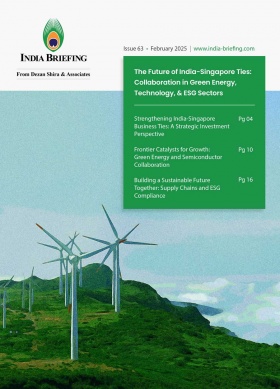India Revises Tax Audit Reporting with Form 3CD Changes Effective April 1, 2025
India has introduced critical amendments to Form 3CD, a tax audit form, by notifying the Income-tax (Eighth Amendment) Rules, 2025. These changes, which take effect from April 1, 2025, impact businesses and tax professionals, making it essential to align tax audit procedures with the updated requirements.
India’s Central Board of Direct Taxes (CBDT) has issued key amendments to Form 3CD by notifying the Income-tax (Eighth Amendment) Rules, 2025, through Notification No. 23/2025 dated March 28, 2025. The amendments, effective April 1, 2025, will impact businesses and tax professionals in the country, making it essential to update tax audit procedures in line with the revised requirements.
Understanding Form 3CD and its purpose
Form 3CD is a critical part of India’s tax audit report mandated under Section 44AB of the Income-tax Act, 1961. It serves as a comprehensive statement used by the chartered accountants (CAs) to furnish detailed information about a taxpayer’s business or profession to the income tax department. The primary objective of this form is to verify compliance with tax provisions, ensure accurate maintenance of records, and facilitate the detection of discrepancies in financial reporting.
The applicability of Form 3CD includes the following:
- Businesses with a turnover exceeding INR 10 million (US$116,967.8) (or INR 100 million/US$1.16 million if at least 95 percent of the transactions are conducted digitally).
- Professionals whose gross receipts exceed INR 5 million (US$58,483.9).
- Entities opting for presumptive taxation but declaring profits lower than the prescribed limits.
It may be noted that the form is divided into two main sections.
- Part A captures basic taxpayer information, including the name, Permanent Account Number (PAN) details, nature of business or profession, and the relevant assessment year.
- Part B requires detailed disclosures on compliance with tax provisions, details of loans and deposits, deductions claimed, tax deducted at source (TDS)/tax collected at source (TCS) compliance, and financial transactions that impact tax liability.
Key amendments to Form 3CD
The latest amendments have been introduced and are applicable to relevant taxpayers in India. These modifications aim to enhance transparency and ensure stricter compliance with tax provisions in the country.
Introduction of Clause 44BBC in Clause (12) of Form 3CD
The recent amendment introduces the inclusion of Clause 44BBC in Clause (12) in Part B of Form 3CD. This clause specifically applies to taxpayers who earn income from broadcasting, telecasting, or rights associated with sports events or performances, as governed by Section 44BBC of the Income-tax Act, 1961.
Under Section 44BBC, income from these sources is subject to presumptive taxation, where a fixed percentage of the gross receipts is treated as taxable income, with no allowance for deductions based on actual expenses incurred. The inclusion of this within Clause (12) means taxpayers in India are now required to disclose whether any income falling under Section 44BBC has been factored into the preparation of their tax audit reports. This addition ensures that all income covered under Section 44BBC is accurately reported, reducing the risk of underreporting.
Omission of specific deductions in Clause (19)
Several deduction-related clauses have been removed from Clause (19) of Form 3CD. The omissions include:
Section 32AC: Deduction for investment in new plant and machinery.
Under Section 32AC of the Income-tax Act, 1961, companies that acquired and installed new plant and machinery were eligible for a deduction of 15 percent of the actual cost of the assets, provided the investment exceeded INR 1 billion (US$11.69 million) in a given financial year. This deduction was available for assessment years 2014-15 to 2017-18. This has now been removed.
Section 32AD: Deduction for investment in backward areas.
Section 32AD offered an additional deduction to companies that invested in new plant and machinery in notified backward areas in states like Andhra Pradesh, Bihar, Telangana, and West Bengal. Eligible companies that set up manufacturing units in such areas were allowed a deduction of 15 percent of the cost of the new plant and machinery, in addition to the regular depreciation available under Section 32 of the income tax law.
Section 35AC: Deduction for expenditure on eligible projects.
This section allowed taxpayers in India to claim a deduction for contributions made to approved projects or schemes that aimed to promote social welfare and economic development. Donations made to such projects, which were notified by the central government, qualified for a 100 percent deduction. Eligible projects included schemes related to education, healthcare, infrastructure, and environmental sustainability.
Section 35CCB: Deduction for expenditure on agro-based programs.
Section 35CCB provided a deduction for expenses incurred on approved programs aimed at promoting agro-based industries or research in agricultural development in the country. Taxpayers who contributed to projects approved by the central government to enhance agricultural productivity and promote sustainable farming practices were eligible for a deduction under this section.
New reporting requirement in Clause (21)
Taxpayers are now required to disclose expenditures incurred for settlements related to contraventions of laws as notified by the central government. This change aims to ensure that all expenses associated with regulatory violations and their subsequent settlements are properly reported in the tax audit report.
Revised MSME payment reporting in Clause (22)
India has also updated Clause (22) of Form 3CD to introduce more detailed reporting requirements for payments made to micro and small and medium enterprises (MSMEs) as per the provisions of India’s MSME Development Act, 2006. The latest amendment now requires taxpayers to disclose specific information related to such payments to ensure better compliance and transparency. Under the revised clause, taxpayers must now report three key details:
- The total amount payable to MSMEs under Section 15 of the MSMED Act.
- The amount of interest that cannot be claimed as a deduction under Section 23 due to delayed payments.
- A clear distinction between payments made within the prescribed period and those delayed beyond the due date.
READ: A Guide to MSMEs in India for Foreign Investors
Modifications in Clause (26)—Deduction under Section 43B of Income-tax Act, 1961
Clause (26) of Form 3CD, which deals with deductions allowable under Section 43B has been modified to clarify the reporting requirements and refine references to specific provisions within the section.
Previously this clause required the disclosure of amounts that were allowable only upon actual payment, such as taxes, duties, and other statutory dues. However, the recent amendment introduces more precise language to differentiate between various categories of payments covered under Section 43B.
Omission of Clauses (28) and (29)
Clauses (28) and (29) have been removed, simplifying the tax audit reporting structure and reducing unnecessary reporting burdens for taxpayers.
Clauses (28) and (29) of Form 3CD previously required taxpayers to disclose specific details related to the compliance and applicability of various provisions under the Income-tax Act.
Clause (28) focused on reporting transactions where the taxpayer was liable to TDS but failed to do so or deducted tax but did not deposit it within the prescribed time. It required reporting the amount of disallowance under Section 40(a) due to non-compliance with TDS provisions.
Clause (29) required reporting any amount of interest, salary, bonus, commission, or remuneration paid to partners that were disallowed under Section 40(b) or Section 40(ba) due to non-compliance with prescribed conditions.
Changes in loan and deposit reporting in Clause (31)
A major change has been introduced in Clause (31) to enhance the accuracy of loan and deposit reporting. A notable addition is the introduction of a drop-down selection feature, which allows taxpayers to specify the exact nature of loan and deposit transactions more effectively.
Additionally, a new coding system has been implemented to categorize various transaction types, making it easier to identify and classify them accurately:
- Cash payments and receipts.
- Asset transfers.
- Journal entries and other transaction types.
Introduction of new clause 36B: Reporting buyback of shares
A new clause, 36B, requires taxpayers to disclose details related to the buyback of shares under Section 2(22)(f) of India’s income tax law. The information that must be reported includes:
- The amount received from the buyback.
- The cost of acquiring the shares.
Section 2(22)(f) of the Income-tax Act, 1961, deals with the concept of deemed dividend. It states that any payment made by a company, either directly or indirectly, to its shareholders in the form of a loan or advance is treated as a deemed dividend if:
- The payment is made to a shareholder holding at least 10 percent of the voting power in the company.
- The payment is made to any concern where such a shareholder has a substantial interest.
The provision applies only if the company has accumulated profits at the time of making the payment. Since this payment is treated as a deemed dividend, it is taxable in the hands of the recipient shareholder.
Implications for businesses and tax professionals
With these amendments, businesses and tax professionals in India need to assess their audit procedures and ensure compliance with the updated reporting requirements. The revised audit form introduces enhanced transparency and accountability, requiring taxpayers to furnish detailed disclosures related to payments, buybacks, and expenditures arising from regulatory contraventions.
Timely adoption of these changes is crucial to avoid penalties and ensure smooth compliance with tax regulations.
(US$1 = INR85.49)
About Us
India Briefing is one of five regional publications under the Asia Briefing brand. It is supported by Dezan Shira & Associates, a pan-Asia, multi-disciplinary professional services firm that assists foreign investors throughout Asia, including through offices in Delhi, Mumbai, and Bengaluru in India. Readers may write to india@dezshira.com for support on doing business in India. For a complimentary subscription to India Briefing’s content products, please click here.
Dezan Shira & Associates also maintains offices or has alliance partners assisting foreign investors in China, Hong Kong SAR, Dubai (UAE), Indonesia, Singapore, Vietnam, Philippines, Malaysia, Thailand, Bangladesh, Italy, Germany, the United States, and Australia.
- Previous Article India’s GST Compliance Changes from April 1, 2025: All You Need to Know
- Next Article India Announces PLI Scheme for Passive Electronics with INR 229.19 Billion Budget








